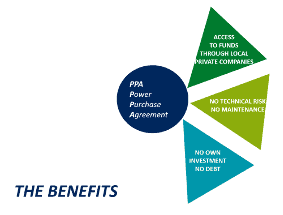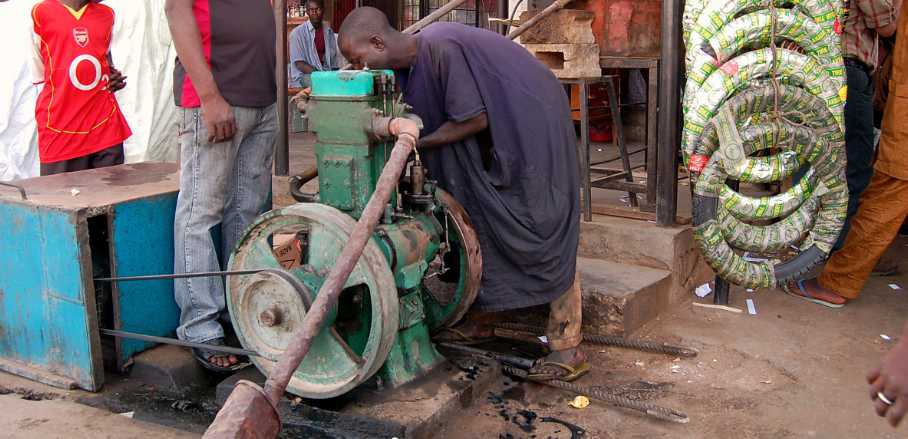Powering Africa’s Future: Leading the Energy Transition with Covenant of Mayors (CoM SSA)
CoM SSA supports cities to access clean and resilient energy, lower greenhouse gas emissions, reduce costs and boost employment. The best part: The cities do not need their own investment.
Walking through the city of Lagos, Nigeria, today, one can feel the reality of insufficient electricity supply. In front of every shop or hotel, gen sets run on fuel to compensate for the shortcomings of the electricity provided by the grid. The generators do the job, but they pollute, and fuel becomes increasingly expensive.
In Africa, 568 million people do not have sufficient access to electricity. In a rapidly growing and urbanising continent that will add an additional 1 billion people to its cities by 2050, access to clean and affordable energy is a key challenge. The large amount of irradiation across Africa offers much potential, which is why converting sunrays into electricity via photovoltaic collectors often is the most economical option. So, what is inhibiting the fast deployment of solar technology in cities?
The Challenges
To some extent, it may be the lack of confidence in the new technology. However, solar has gained a growing share of energy for the industry as well as the private sector in several sub-Saharan African countries. For city governments, to a much larger extent, the challenge is posed by coming up with the initial investment and carrying the risk when developing and operating a system for twenty years or more.

In sub-Saharan Africa, urban areas are growing at a high pace, and infrastructure and services are not living up to the needs of today – not to mention tomorrow. Negative effects of climate change – to which Africa is already over-proportionally exposed – add to the problem’s complexity. In this situation, city governments mostly neither have the mandate nor the capacity to absorb (foreign) debt to finance infrastructure. Yet, a large proportion of infrastructure, such as buildings, energy, water, and transport, that falls on the city governments´ shoulders requires long-term investment including a heavy capital load. Additionally, these projects require intensive project preparation capacities that cities cannot provide.
The Purpose
As an initiative that supports cities in meeting their climate and energy commitments, CoM SSA builds on the realities in signatory cities – among which there is a lack of budget to fund new infrastructure.
To create more resilient and environmentally friendly city infrastructure, the CoM SSA initiative has examined various technologies that have already demonstrated a successful track record. Among the most economically viable solutions are energy efficiency measures and decentralised photovoltaic systems.
In this regard, Urban Smart Energy (USE) is a support product for local governments to systematically examine all the energy-consuming real estate owned and operated by the city and assists in identifying how to bring down energy costs for the administration, reduce greenhouse gas emissions and improve the infrastructure’s resilience.

As part of USE, CoM SSA along with legal, technical and economic experts is examining all city-owned sites – such as markets, schools, town halls or health facilities – to find out whether a solar energy installation or energy efficiency measures are technically feasible and economically viable. CoM SSA uses an evidence-based approach through the long-term use of smart meters and field visit questionnaires to ensure the selection of sites that are not only suitable for a PV system but also ensure reduced costs for the city.
Examining the sites serves to cluster them into economic lots (highly profitable, less profitable, not profitable) or lots with a similar energy need profile (schools, hospitals, markets). Once the lots are established, the city government tenders the selected sites to find a suitable private sector actor to implement the project.
The Benefits
Ideally, the city will tender the sites via an ‘energy as a service’ model through a Power Purchase Agreement (PPA) with a private sector actor by proposing to the market to buy electricity instead of the underlying technology. That way the city does not have to invest or provide maintenance and the future contracting partners are free to choose their equipment, their installer, and their financing scheme. As long as they deliver energy, the city will pay them. CoM SSA assists its partner cities in conducting the tendering procedure, overseeing the necessary documentation and finalising the PPA agreement.

By signing a PPA with a private company, the city government seeks several advantages. Firstly, this arrangement allows the city to avoid additional investments, thereby preventing the creation of new debt. Secondly, the city is not exposed to any risk associated with making a decision on a technological offer such as material, installation, and cost calculation. Moreover, the city is not required to conduct the operation and maintenance of the PV system. In addition to these benefits, the PPA will also contribute towards enhancing the market for local installers and importers of materials, hence, increasing local employment and income and thereby creating a more vibrant and prosperous community.
Currently, CoM SSA is actively building project pipelines in Nigeria, Kenya, and Cameroon, and will soon be starting in Ghana and Tanzania. USE is a product that is well adapted to the market and can be rolled out across sub-Saharan Africa. In that way, USE is paving the way towards a sustainable future – and takes us one step closer towards a cleaner, greener tomorrow.
